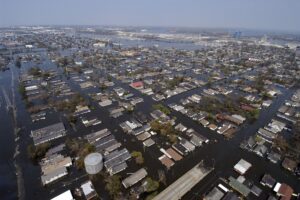Medical Recruitment Companies: A Partner in Climate Change Preparedness

The consequences of climate change are here. Populations are already shifting as catastrophic events create unsustainable environments. Medical recruitment companies, already operating in overdrive due to worsening practitioner shortages, are preparing for another surge of demand as environmental factors loom large over the healthcare system. In the long-term, climate change will put an increasing burden on hospital resources. Add record numbers of practitioners leaving the profession than ever before to an increase in the number of people needing care and you’ll find an uncomfortable equation.

According to the World Health Organization, “between 2030 and 2050, climate change is expected to cause approximately 250,000 additional deaths per year from malnutrition, malaria, diarrhea and heat stress alone.” All disasters have some immediate consequences: limited access to care when infrastructure is damaged or even temporarily compromised and mental health challenges as communities struggle to reacclimate. In the long-term, an increasing demand for medical personnel and a rise in illnesses will create barriers to quality healthcare.
Though previously implemented “disaster preparedness” plans are in place, recent events have laid bare the limitations of procedure implemented to deal with infrequent emergencies. Areas that have dealt with one primary sort of weather event must now consider preparedness for the unexpected or unfamiliar.
Here are some basics to consider.
Floods

Floodwaters often contain contaminants that cause skin and stomach illnesses, which can lead to diarrhea, vomiting and fever. Bacteria-laden waters make open wounds or even minor abrasions vectors for infection and in some cases, can cause death within a matter of hours. Stagnant water can also breed mosquitoes, leading to outbreaks of mosquito-borne diseases.
Wildfires
A sharp decrease in air quality can result in respiratory diseases, such as asthma and bronchitis. The smoke and particles released in the air during a wildfire can cause more severe health complications, including an increased risk of both heart and lung diseases.
Heatwaves
Heatwaves have become increasingly frequent and intense, with dramatic effects to human health and mortality. In a major heatwave event, extreme temperatures can cause dehydration, heat exhaustion, and heat stroke, even in individuals who are normally healthy. Heat waves have a disproportionate effect on seniors, children and people with chronic medical conditions. Extreme temperatures can also cause medical equipment to malfunction.
Hospitals and clinics struggle if they are not appropriately equipped when major events hit. An influx of patients and shortages of event-specific medications and equipment make for dire consequences. But by far, the biggest threat to communities is a shortage of healthcare workers to address the dire needs of communities grappling with weather-related challenges.
How a medical recruitment firm can help

A medical recruitment firm can be a valuable partner in helping the healthcare system mitigate the effects of climate change by providing solutions for medical facilities and providers as they prepare for weather disasters and the incumbent health issues. Using specialized recruitment strategies and comprehensive vetting processes, medical recruitment companies can quickly fill gaps in staffing. A physician recruiter can also provide healthcare organizations with access to a larger pool of talent, as well as providing access to innovative technology and data-driven solutions that can help them assess and respond to potential climate-related risks.
Medical recruitment companies can also help healthcare organizations prepare for long-term changes in patient demographics. Climate change can lead to increased migration, both within and between countries, resulting in a greater need for language services and cultural competency. Staffing agencies can provide multilingual staff to meet these demands, enabling medical providers to treat patients more effectively and efficiently.

In addition to these measures, a medical recruitment company can provide healthcare organizations with access to cutting-edge technological solutions. Many of these solutions focus on data-driven optimization of medical services, which can help anticipate and prepare for changes in demand due to climate change. For example, health IT solutions can be used to predict and monitor disease outbreaks, allowing providers to respond rapidly and proactively to emerging health risks.
Overall, a physician recruiter can play an important role in helping the healthcare system mitigate the effects of climate change. From providing temporary staff to responding to changes in patient demographics, medical recruitment companies have the tools and expertise to help healthcare organizations anticipate and prepare for climate-related risks and disasters.
Climate change has had a devastating impact on the US healthcare system. The rise in heat-related illnesses, air pollution, and vector-borne illnesses is creating an unsustainable burden on the healthcare system and its resources. In order to combat these impacts, healthcare providers must be proactive in addressing staff shortages – and a good medical recruitment firm can be an integral part of preparedness. If you want to better protect the health and wellbeing of your patients now and in the future, MASC Medical can help.